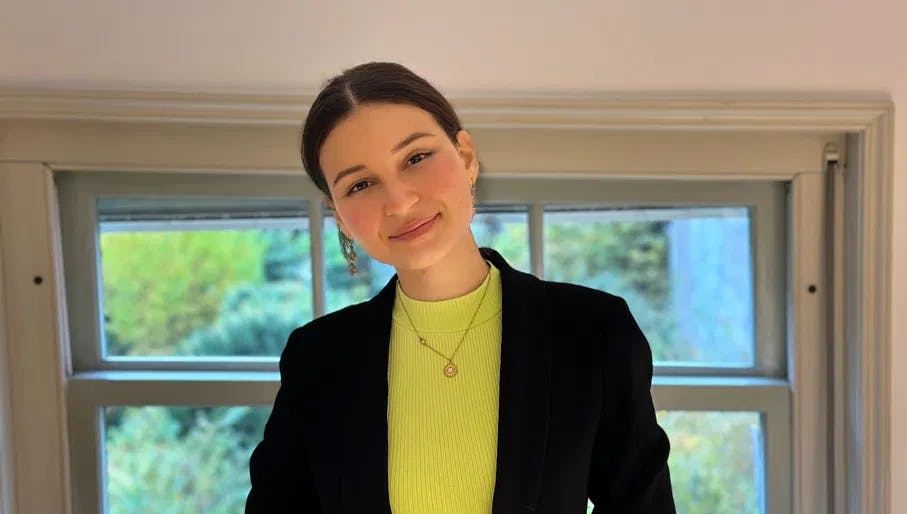
#FoundersFridays: Meet Bibi Schmidt
21 May 2025

#FoundersFridays is an interview series about entrepreneurs, for entrepreneurs. Each edition features a founder sharing key learnings, milestones, challenges, and reflections—especially on Amsterdam’s role in the Dutch innovation and impact ecosystem.
For this #FoundersFridays interview, we spoke with Karolina Fedorowicz, founder of RIFT Spatial Technologies, a new company that was born in Amsterdam and recently moved to New York. RIFT wants to be the main technology that helps different types of software understand spaces for things like augmented reality (AR), robots, and defense. Their technology uses advanced computer programs called machine learning (ML) to combine signals from devices like WiFi with how people move around to figure out what a place looks like, even when GPS or other signals don’t work.
My whole life, I watched my mom take on new projects with passion and enthusiasm. Whenever she wanted to start something or learn a new skill, she didn’t overthink it. She just acted. Growing up with someone who saw life as a space for creativity and didn’t let fear guide her, I naturally followed the same path.
When I moved to the Netherlands for my studies, I started working in a restaurant during the Covid-19 pandemic. I quickly noticed there were no tea shops as an alternative to coffee cafes in Groningen. I pitched the idea to my boss, and it became my first real venture. I handled everything from building the shop to working with suppliers and planning the marketing.
As a child, I thought creativity only lived in art and crafts. Entrepreneurship showed me it also lives in building things from scratch, solving problems, and bringing ideas to life. That energy, along with my mom’s influence, is what led me to become an entrepreneur.
It’s funny because it started with Pokémon Go and noticing how limited the experience was when trying to interact with digital content in the real world. The problem with location technology like GPS is not just that it lacks precision, but that it doesn’t work well in places made of concrete or near water, which is basically most of our cities, or in conflict zones.
We realised that knowing your location is more than just getting coordinates on a map. For things like robots, augmented reality (AR) apps, or even national defense, you need to understand what the space around you actually looks like and how people move through it. That is what we are working on. We are building a system that doesn’t rely on cameras or special hardware. Instead, we use machine learning to teach it how to understand real-world environments based on how people naturally interact with them.
We also care deeply about privacy. We don’t want to build something that feels like it’s from a Black Mirror episode. Our mission is to make location-based experiences safer and more useful, without tracking people or collecting unnecessary data. That’s why my co-founder James Coggan and I decided to join forces and create RIFT.
Amsterdam has hosted me for a long time, and I’ve always felt at home here. It’s one of the most progressive cities in Europe, full of talent and creativity.
The community is open-minded and welcoming. When we first launched and shared our venture in local social media groups, people quickly offered help, whether with development or marketing. I try to attend as many networking events as I can to meet other builders and founders. As a cosmopolitan hub at the heart of Europe, Amsterdam also offers many events in tech and innovation, which makes it easier to learn and connect with the right people face to face.
The biggest win has been seeing people truly believe in our idea and want to join our mission. It was incredibly touching to see individuals willing to become early supporters or team members, even if it meant taking a pay cut from high-paying jobs. When that happens, it’s a strong reminder that you have to keep going and stay committed to the mission you’ve set.
We’ve also received very positive interest from early clients and people in industries I never expected to be interested in our technology, such as maritime and air force.
Every day is truly a learning experience. For us, the most important mindset is to treat challenges like math problems—they are there to be solved. Another key lesson is the need to bring clarity and structure to what can sometimes feel like a chaotic vision. Having a plan is very important, even if you need to adjust it along the way. As a leader, I have also learned how important it is to manage my own emotions so they don’t slow down progress or affect the team. At the same time, I need to be the support my team needs, both professionally and personally.
RIFT has gained strong momentum and received tremendous support from many people. However, there is still a lot to be done in terms of product development and promotion. Right now, we are in a pre-seed fundraising round and are looking for investors with experience in deep tech and machine learning. We also want to connect with founders and companies in the robotics and defense industries to start building relationships and better understand the trust and permitting requirements involved. Additionally, I would welcome opportunities to connect with government officials in defense, city planning, and tourism departments, as well as consulate startup communities that offer grants or programs to support innovation.
If you’re an Amsterdam-based founder working on an innovative solution to an urban or social challenge, and you’d like to share your story with our audience, email Catalina Iorga.